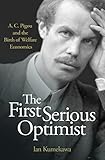The First Serious Optimist : A. C. Pigou and the Birth of Welfare Economics / Ian Kumekawa.
Material type: TextPublisher: Princeton, NJ : Princeton University Press, [2017]Copyright date: ©2017Description: 1 online resource (352 p.) : 6 halftonesContent type:
TextPublisher: Princeton, NJ : Princeton University Press, [2017]Copyright date: ©2017Description: 1 online resource (352 p.) : 6 halftonesContent type: - 9780691163482
- 9781400885206
- Economics -- History
- Economists -- Great Britain
- Welfare economics
- BUSINESS & ECONOMICS / Economic History
- A Study in Public Finance
- A. C. Pigou
- Alfred Marshall
- Arthur Cecil Pigou
- Austin Robinson
- British economist
- Cambridge
- Clarence Pigou
- Great Depression
- Industrial Fluctuations
- John Maynard Keynes
- Labour Party
- Nora Lees
- Oscar Browning
- Philip Noel-Baker
- The General Theory
- Wealth and Welfare
- World War I
- World War II
- academic economics
- academic journals
- atrocity
- bureaucracy
- carbon taxes
- climate crisis
- common people
- death
- disillusionment
- economic ideas
- economic science
- economics journals
- economics
- ethics
- government
- historical reformer
- influence
- interwar period
- legacy
- liberalism
- morals
- objectivity
- optimism
- optimist
- political advocacy
- political economy
- political involvement
- politics
- pollution
- public welfare
- retirement
- science
- social reform
- societal wellbeing
- state action
- state apparatus
- welfare economics
- 330.1556092 23
- HB103.P54 K86 2018
- online - DeGruyter
- Issued also in print.
| Item type | Current library | Call number | URL | Status | Notes | Barcode | |
|---|---|---|---|---|---|---|---|
 eBook
eBook
|
Biblioteca "Angelicum" Pont. Univ. S.Tommaso d'Aquino Nuvola online | online - DeGruyter (Browse shelf(Opens below)) | Online access | Not for loan (Accesso limitato) | Accesso per gli utenti autorizzati / Access for authorized users | (dgr)9781400885206 |
Frontmatter -- Contents -- Acknowledgments -- Introduction. History and Economics -- Chapter 1. Beginnings -- Chapter 2. Ethics, Politics, and Science -- Chapter 3. Bearing Fruit as Well as Light -- Chapter 4. War, Peace, and Disillusionment -- Chapter 5. Retreat to the Ivory Tower -- Chapter 6. Paradigms Lost -- Chapter 7. Another War and a Fresh Start -- Chapter 8. To "Really Do a Little Good" -- Epilogue -- Notes -- Bibliography -- Index
restricted access online access with authorization star
http://purl.org/coar/access_right/c_16ec
A groundbreaking intellectual biography of one of the twentieth century's most influential economistsThe First Serious Optimist is an intellectual biography of the British economist A. C. Pigou (1877-1959), a founder of welfare economics and one of the twentieth century's most important and original thinkers. Though long overshadowed by his intellectual rival John Maynard Keynes, Pigou was instrumental in focusing economics on the public welfare. And his reputation is experiencing a renaissance today, in part because his idea of "externalities" or spillover costs is the basis of carbon taxes. Drawing from a wealth of archival sources, Ian Kumekawa tells how Pigou reshaped the way the public thinks about the economic role of government and the way economists think about the public good.Setting Pigou's ideas in their personal, political, social, and ethical context, the book follows him as he evolved from a liberal Edwardian bon vivant to a reserved but reform-minded economics professor. With World War I, Pigou entered government service, but soon became disenchanted with the state he encountered. As his ideas were challenged in the interwar period, he found himself increasingly alienated from his profession. But with the rise of the Labour Party following World War II, the elderly Pigou re-embraced a mind-set that inspired a colleague to describe him as "the first serious optimist."The story not just of Pigou but also of twentieth-century economics, The First Serious Optimist explores the biographical and historical origins of some of the most important economic ideas of the past hundred years. It is a timely reminder of the ethical roots of economics and the discipline's long history as an active intermediary between the state and the market.
Issued also in print.
Mode of access: Internet via World Wide Web.
In English.
Description based on online resource; title from PDF title page (publisher's Web site, viewed 30. Aug 2021)


